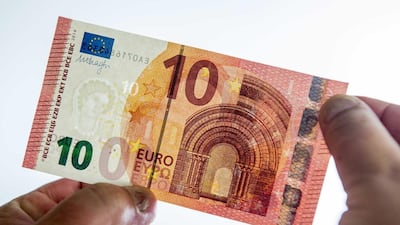The slump in the euro is a boon for UAE-based European expatriates transferring their dollar-pegged dirhams back home. But the situation is not so rosy for those living in the Emirates who earn in the euro.
The Abu Dhabi teacher Sebastien Gousset, from France, is among those feeling the pinch from the weakened currency in his home nation.
Despite living in the UAE for the past nine years, he is paid in euros rather than the dirham.
Two years ago the 36-year-old received €6,000 (Dh23,984) a month in his European bank account.
After paying credit and taxes in France, €4,000 was then transferred to his UAE account allowing him Dh20,000 to spend here.
Fast forward to the present and everything has changed, except Mr Gousset’s salary. Today, the father of two sons, aged two and six months, receives just Dh16,400 into his account from his €4,000 salary, thanks to the fall in the euro-US dollar.
“We like living here and had planned to stay for another year, but it was getting very hard with the lower euro exchange and increased inflation,” says Mr Gousset, adding that he and his wife, fellow teacher Camilla, will leave for jobs in Cameroon at the end of June.
The decline in the euro has hit a 12-year low, following the roll-out of the European Central Bank’s (ECB) quantitative easing (QE) programme in March.
The ECB said it would purchase €1.1 trillion in government assets across the 19-member euro zone as part of its efforts to stop the continent slipping deeper into deflation.
But the ripple effects of the decision have had a devastating effect on the purchasing power of professionals such as Mr Gousset as many UAE expats are paid in euros or in the currency of the country in which their employer is based.
Some multinational firms, for example, offer employees the opportunity to choose between the firm’s home-based currency and the local currency. However, employees are usually locked into the initial payment choice.
“It helps minimise firms’ risk of currency exposure so all costs are in one currency rather than multinationals having to exchange into multiple different currencies to pay staff all over the world,” explains Angus Campbell, senior analyst at the currency trading platform FXPro.
“For example BlackRock pay their staff in dollars no matter whether they work in London, Paris, Sydney or Dubai.”
But for those based here paid in the euro, the strategy no longer pays off.
At its peak last June, the euro to the dirham stood at Dh6.27. It fell to its lowest rate, a drop of 39 per cent, in mid-March to Dh3.85 although the currency has made recent gains to around Dh4.
Couple the euro’s decline with the rising cost of living in the UAE and many expats are feeling the pinch. Inflation has increased in the UAE to its highest level since 2009, according to the National Bureau of Statistics.
The organisation said the major costs eating up salaries include housing and utilities, which have risen across the Emirates by 7.4 per cent just over the past year.
“Expats who are getting paid in euros are paying more for goods and services in their country of residence which can be frustrating. It’s totally out of their control,” says Mr Campbell, adding that the situation is unlikely to resolve itself in the months or even years ahead.
This is why Mr Gousset feels he has little choice but to move on. Two years ago, after paying the necessary bills, his spare spending money amounted to Dh6,095. However, today that extra has dwindled to just Dh160.
“We don’t meet friends in restaurants any more, but rather at homes,” he says, adding that he had to stop taking boxing lessons at a nearby club because finances didn’t allow such luxuries any longer.
“Right now we don’t have any debt, but had we stayed on for one more year we would have,” he adds.
One employee with a German company based in Dubai, who did not want to be named, says he saw the writing on the wall when the euro started to plunge.
He immediately began negotiations at his firm to switch from the euro to the dollar-pegged dirham, migrating about three months ago. The company agreed to pay him in dirhams based on an aggregated amount compiled from last year’s euro rates.
Others paid in euros say asking their employer to switch currencies would be the same as negotiating a pay rise. They believe it would be an arduous process and many don’t want this currency negotiation to replace an actual promotion. But the situation for euro-earning expats may not be changing any time soon.
“The ECB’s quantitative easing programme is designed to push the euro lower,” says Mr Campbell.
Another factor in the euro story is Greece, says Mr Campbell, with the growing possibility it might leave the euro zone – in the event a bailout deal is not reached with the EU this weekend – set to create considerable market turmoil.
“Our general expectation is that the euro will weaken from its current levels,” says Jack Allen, chief European economist at Capital Economics.
“We expect the euro zone economy to remain weak, eurozone monetary policy very loose and the Greek crisis to continue if not escalate. We have predicted that the euro will fall to parity to the US dollar by the end of this year.
“If you have a salary fixed in euro terms and expenditure is in another currency that the euro falls, that’s clearly bad for you.”
lgraves@thenational.ae
Follow The National's Business section on Twitter

